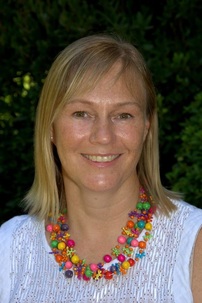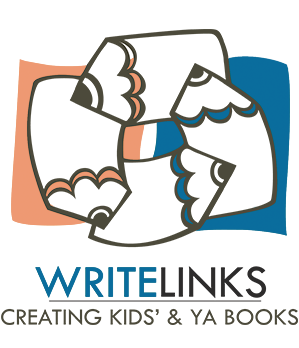Tyrion Perkins reports … Critical Reading for Writers by Melanie Hill
 Presenter and author Melanie Hill and Write Links coordinator Yvonne Mes.
Presenter and author Melanie Hill and Write Links coordinator Yvonne Mes.
Melanie took us through the process of how to get more out of your reading by focusing on Harry Potter and the Philosopher’s Stone.
She started with a short quiz, which she used to show how well JK Rowling had planned the books. As a member of the audience, I tried not to do a Hermione, but no one else seemed to have reread them over and over to learn their inner workings. Despite my vast knowledge, Melanie went on to tell me how to get even more out of reading.
The cover:
When you pick up a book it makes you a promise.
The first Bloomsbury cover of Harry Potter and the Philosopher’s Stone shows a boy in front of a bright red train. It is clearly for children and about a boy going off to school. When you turn it over and see the odd-looking character on the back and read the blurb, it suggests fantasy.
This creates expectations in the reader – for unusual and magical things, and would you like it if the baddy was a muggle?
The First page:
Some books don’t have chapter headings, but this one does. “The boy who lived” tells us that someone died, but someone also made it. It makes you curious.
Two families are mentioned – the Dursleys and the Potters. They are introduced by adults so that we can meet Harry as a baby – why? So we can hear about Harry and Voldemort at the same time. It shows how important both are to the book.
Tip: After finishing a book, go back and reread the first page so see how well it was set up.
The writer’s background:
Joanna Rowling’s favourite authors were Jane Austin and Roald Dahl. She studied classic literature and French, and you can see the influence in the books. She started writing the first one at a time when her mother had died and marriage had broken up, leaving her with a baby and not much money. Death is a strong theme in the books.
Other things to think about when reading:
- Point of view: First person, third person close, or third person omniscient? And why?
Do you trust the narrator? Why or why not.
- Plot is the sequence of events. In this book they happen chronologically. Why do they happen in that order? Can they happen in any other order?
- Story is the struggle and change in the protagonist. What are the decisions the character makes? And what are the consequences, good and bad?
- What are the problems and goals? and what role do they play?
- How are backstory and other necessary information given to the reader? E.g. Via characters, library, study, and in later books via the Pensive.
- How is description of the world and the people done and what role does it play?
- Characters: The three main categories are Protagonist, Antagonist, and sidekicks. What role do they play and bring to the story? How are the names used to add meaning?
Themes in this book:
Death and meaning for life
Family
Love
Good vs evil
Bigotry
Criticisms:
Do you have any? (Most of us went blank at this one, I thought of a few later, such as detention in the deadly forbidden forest.) Melanie mentioned:
Harry is not damaged much by his abusive upbringing.
Harry never fails.
Magic doesn’t come at a cost. – I baulked at this one and I personally think it depends how you set up your story. Apparently it comes from fantasy writers and readers who are used to the cost. One attendee pointed out that the bigotry theme requires the ability to do magic to be inherent, like the colour of your eyes or skin, so it would be strange if that came at a cost.
Report by Tyrion Perkins

Comments
Sorry, the comment form is closed at this time.




Jacqui Halpin
Well presented and well summed up! Thank you, Mel and Tyrion 🙂